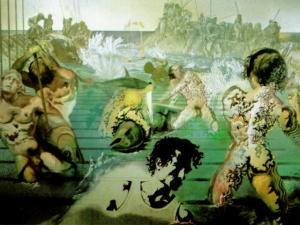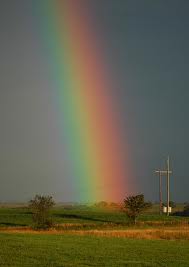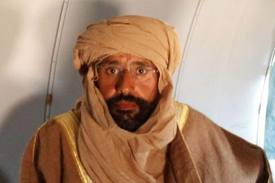Revolutionary Music
June 13, 2012
One of the offshoots of the Arab Spring has been the revitalization of grassroots music scenes in Arab capitals from Tunis to Jeddah. Here is an edited selection of revolutionary music from all over the Arab world.
Damascus:
Omar Offendum- #Syria
Cairo:
Cairokee- Ya Maidan
Tunis:
Emal Methloui- Kelmti Horra
Of course, revolutionary music is nothing new and hip-hop/spoken word have been inspiring activists for generations. Here are some of my favorites:
Immortal Technique- Resist Mind Control
Lowkey-My Soul
Ani Difranco- Swan Dive
Enjoy!
Uprisings, Love and Other Surprises
January 4, 2012
So, it’s on. We have revolutions to the north, to the west, to the south, to the east. All across the world, youth, the unemployed, students, workers and people from all social classes are demanding governments that represent their interests instead of the nepotism and cronyism which have benefitted a small class of moneyed elite and the political alliances that they make.
So what now? “If the Egyptian uprising wants to progress toward a revolution, it has to push aside all lame liberal voices.” -Asad Abu Khalil.
New governments are being formed in Tunisia and Egypt, yet they mainly reproduce old notions of statehood, power and representation. We are unable to express difference in terms of power. This, so far, has been our human quandary. How to build a government that truly represents the ideas of minority groups instead of excluding or co-opting them? Or, a government that is not divided into majoritarian and oppositional groups?
There are many models for this, yet all of them remain partial. I think, in the coming months, it will be necessary to stick to a radical insistance on thinking that is new, denying all tried paths. Of course, I am not telling my contemporaries anything that they do not already know.
Interesting Questions from the 2011 Revolutions:
1. Is there such a thing as the collective mind? Popular wisdom seems to think so. Can we really think for ourselves at all? Or do we merely pick from a numer of choices that we have cobbled together from media images and societal expectations? Are we just products of our time? If we admit that we do have a collective destiny or situation, that might be the first step towards making a revolution permanently.
2. Activism is an accumulation of small daily acts of resistance. Never underestimate the power of ideas. Ideas in the hands of millions turn into material force, as Karl Marx said. This is why art, culture and media are essential to the continuing global revolution.
3. Don’t be naive about “democracy.” Democracy is not just voting. Americans have had democracy for 200 years and still manage to have one of the highest inequality ratios in the world while perpetrating numerous wars, coups, military assistance and torture centers around the world. Could we form a new system that expresses the real will of the people?
Why We Write
November 16, 2011
(published on Sawt Al Niswa web-zine on November 15th 2011)
Is writing a desire to confess? A cry in the dark, a desire to be known, to be read? In her 1997 essay, quoting the poet Muriel Rukseyer, the American poet and social activist Adrienne Rich said, “If there were no poetry on any day in the world… poetry would be invented that day. For there would be an intolerable hunger.”1 Sometimes this hunger to leave a mark of one’s existence seems like some sort of perverse willfulness. At other times, it becomes absolutely necessary.
I write in order to heal my brain, organically. We create stories and re-create them, every few months, it seems, to deal with the shifting and boiling temperature of inner life. In this “white heat” of writing, time dissolves and the past and the future converge into one moment where the tip of the pen meets the paper. (Or when the mechanical imprint of the character appears on the screen; the psuedo-ink?) In writing, I am calm, I hope I am calm. I will tell myself that everything is smooth, has a surface, is reflective… Keeping a journal allows one to chart the ups and downs of daily life as well as the divisions between our personal, professional, relational and private lives. Where poetry breaks down these barriers in a flash of insight, narratives can build them back up.
If I had to choose, I would choose to sing rather than to write. What is it about singing that cuts to the heart, that opens an immediate pathway between the singer and the listener? A song appears once and is gone, it is bound to a particular moment in time and to a place, a stage. All of the feelings, moods, and vibrations of an experience pulse together when listening to a song performed live. It strikes me that a singer onstage (or a spoken-word poet for that matter) is like a political activist delivering a speech. She cannot cling to her mantle, her power, after using it or else it becomes a shroud. She knows that her power lies in mediating between the world and power, and that is her gift.
Justice, to me, is a big tawny bird with feathers of copper and gold. She eats truth, she is a woman covered with blood, having birthed herself and cut the cord. She is a painter, an image weaver, singing out her reel of films and string… the bird filled with mercy, a woman in a cup, a ribbon, smiling wholly, she erases everything and sings her own song, like the phoenix, who appears to sing out its unique song, to make words into arrows and into necklaces to celebrate what is being done right and all the work left to do. For, “[f]reedom is not necessarily a path, it is an ether into which one plunges… where one merges with what was held back from ecstasy…”2 If writing were not political/ i would tear my hair out/ it’s not delicate, aesthetic butterfly/ wings coated with a fine silver dust/ it is not the underside of clouds…
As a woman I have been inspired by writers, song- makers, artists and poets. I suppose what I always shouted at my brother, “it’s not fair!” is still the guiding truth of my life. It was this choice that propelled me to switch majors from Comparative Literature to Anthropology. I wanted a discipline more in tune with political and cultural life. The political theorist and philosopher Hannah Arendt named the joy one experiences when acting in public, “public happiness.” Public happiness is the great treasure of all of those who live through revolutionary times and feel the exhilaration of acting in such a way as to make a difference in the world. One sees the joy in the faces and voices of the protesters. However, this is not true, re: Arendt, that the signposts we used have worn away; they have just been re-invented, re-inscribed with new meanings. Anthropology, then, has more in common with archaeology than I thought. We dig up forgotten meanings, excavate and brush off old concepts and forgotten texts that may help us to see the world we live in a new light.
We know that one cannot live by bread alone, but writing, in particular academic writing so often seems an unnecessary embellishment on top of the sounds and speech of everyday life. At the same time, as academics, as teachers and writers, we must be responsible witnesses, to try to create platforms for thought and reflection. Academics must be activists in this era of propaganda and spinning of truths so that our own faces are no longer recognizable in the stories we are forced to create or tell about ourselves in order to pass muster with the architecture of corporate life. We must create a world where knowledge can flourish and help to build society, rather than serve destruction and war.
Our bureaucratic institutions thrive on cultures of paperwork. We gather facts and we sort them and file them. Our libraries fill with books. Yet, at a certain point, the time for writing must come to an end. It is not acceptable anymore to bear witness to the daily injustices. We must translate our ethics into practice, in the very slippery and incomplete ways that they must be. The time for careful discourse is over, we must say something, anything. It is time to go down to the streets. If you are not willing to put your body where your mouth is, then your words have no real meaning. Writing must live between the body and speech. It must live as a text. It is to this end that we write, again and again, because the distance between experience and expression is always too big a gap.
Truth-telling in the Age of Opinion
October 2, 2011
Hannah Arendt Center Thinking Challenge
October 1st 2011
In the age of rapid- response media, truths are deployed like hard drives, consumed and then over-written by newer, faster, more expedient truths. We want instant insight and commentary, not hard- won wisdom. Contemporary journalism in the United States is broken when there is no culture of analysis to support it, when pundits offer pre-packaged opinions that are wielded with nonchalance by everyone from citizens to senators alike. Debate meanders circularly and there is no resolution because there are no facts or values held in common. This is how something like climate change which is recognized by 98% of scientists can become a matter for debate. The remaining 2% of scientists can become a credible reason for doubt. After all, truth is all in how you tell it, which facts you reveal and which you keep hidden, which are distorted and which are twisted beyond recognition by losing their context and history. The appearance of fact is enough in a timeless, soulless world. What is truth-telling in the age of opinion?
Listening to Syrian- American hip-hop artist Omar Offendum’s album, SyrianamericanA, throws into relief the tensions and richness of cross-cultural experience. The narrator is living a life that is familiar to those who cross between the Arab world and the West. Each verse becomes a meditation on colonialism, Orientalism, the nomadism of “success,” feeling torn between two cultures, two moralities, two inseparable, dissimilar lives. ” Look up in the sky, it’s a bird, it’s a plane,” he sings. “it’s an Arab super hero and he came to bring change.” The voices of truth-telling in the future belong to those who are caught, by chance or circumstance, in between two or more conflicting narratives of power– when ideologies are examined in the light of lives we must live, the story unravels and we can see beyond the frame.
Tunisian revolutionaries have expressed “we don’t want to be called by the names of flowers!” Especially after the Tunisian Ministry of Tourism has marketed the country for years as a land of exotic fragrances and accessible to Europe Mediterranean charm. The Arab revolutions, not “the Arab Spring,” or “the Jasmine Revolution,” offer new possibilities for speaking and thinking from and to the centers of power. Once ignored by the mainstream media, activists, in particular from the Egyptian youth movements, have been featured on Al-Jazeera and honored by establishments of “human rights.” With this recognition, however, comes an even greater challenge. The call by Egyptian activists at the beginning of the revolution was for each man, woman and child to come down into the square. Not only those who have access to blogs, Twitter or Facebook, those who are young, globally connected, or connected to leftist politics were responsible for the events which are continuing to shake the foundations of the world we thought we knew. We all have a responsibility to the cities, the politics we find ourselves in. Hannah Arendt said famously that “freedom has a space, a place.” (The Promise of Politics) These spaces, Arendt says, are the heart of the city or polis and contain the essence of democracy. The Bahraini regime knew this perfectly well when they destroyed the Pearl Roundabout which had been the epicenter of demonstrations in March of 2011. Around the world, public spaces are being reshaped and reclaimed as spaces of dissent, debate and action.
These spaces are not given for free. Waves of development have ripped out the collective spaces from cities, turning historic neighborhoods into block of “luxury flats” or boutique hotels which cater exclusively to foreigners. Gentrification pushes families further away from the centers of cities into hard to access suburbs. Beirut’s cosmopolitan charm is largely a fiction invented by the tourism industry. Recently in Beirut, several friends have been wounded by thugs of the Syrian regime. People are pulled off bar stools for criticizing Assad’s regime and beaten up in nearby alleys. The freedom that we struggle for is not an abstract, but a daily sensous reality. It demands an awareness and a greater attention to the small politics of daily life. Sometimes a revolution can be a few previously unspoken words, sometimes it can be a look for or against what is easily apparent. At all times, it is the will to resist “the way things are.”
A friend of ours who was being prosecuted by a military court for his activism committed suicide last week in Beirut. “I die as I have lived,” he wrote, “a free spirit, an anarchist, owing no aliegance to rulers heavenly or earthly.” In the discourse surrounding his death, however, one truth risks being drowned out by the fervor to write his death as a heroic gesture, a revolutionary position. That truth, rather quietly, is that Nour had struggled for many years with severe depression. It seems wrong to paint him as a hero in death when he might have lived as a man. If we were to follow Nour’s example, we would work tirelessly and quietly for the causes we believe in. Truth, in the manner of an enduring wisdom, is always soft-spoken, always humble and often found in unexpected places.
Urbanity in a Navy Blazer: The Case of Saif Al-Islam
October 1, 2011
Saif Al-Islam Al-Qaddafi
The BBC calls him “stylish.” As the regime’s face to the West, he spent much of his time hob-nobbing with the British royal family and the international jet set.
This calls to mind Tayyib Salih’s brilliant novel, Season of Migration to the North, which tells the story of a Sudanese mathematician who moves to London. His professional colleagues never really accept him, despite giving him awards and inviting him to glamorous parties.
When Saif al-Islam’s role in the crackdown against protesters was reported, LSE director Howard Davies resigned from his post after facing criticism for accepting donations from the charitable foundation led by the son of the Libyan leader.
The university is also investigating the authenticity of Saif al-Islam’s PhD thesis, amid reports it was plagiarized.
I will leave you with a list of maxims:
Clothes don’t make the man.
Costume makes the king.
The emperor has no clothes.
For more, click here.







